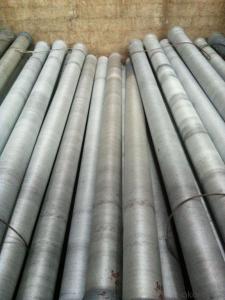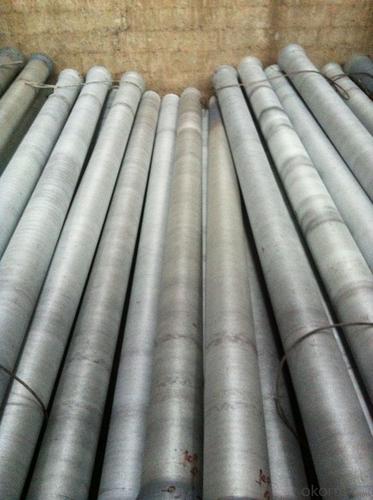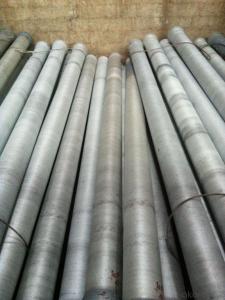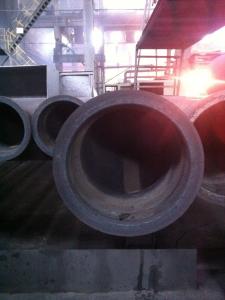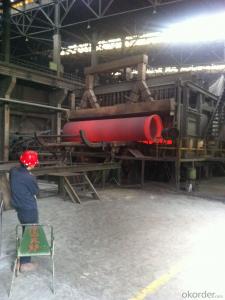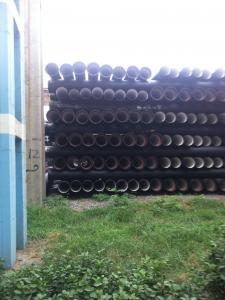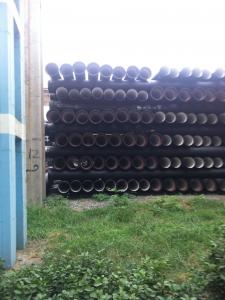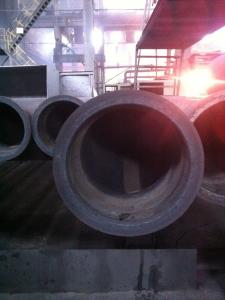DUCTILE IRON PIPES AND PIPE FITTINGS K9 CLASS DN500
- Loading Port:
- Tianjin
- Payment Terms:
- TT OR LC
- Min Order Qty:
- 22 pc
- Supply Capability:
- 3000 pc/month
OKorder Service Pledge
OKorder Financial Service
You Might Also Like
Material : Ductile Cast Iron
Size Range : DN 80mm to DN 2000mm
Unit Effective Length : 6m or 5.7m
Manufacture Standard: ISO 2531:1998/ EN 545:2006/EN 598:2007
Annual capacity : 200,000 tons
Coating Exterior: Zinc 130g/m2 according to ISO 8179-1 and bitumen coating 70 microns.
Cement Interior: Portland Cement/ High Alumina Cement/ Sulphate Resisting Cement Lining according to ISO 4179
Special requirements on external coating and internal lining can be applied
We also provide accessories such as SBR/EPDM rubber gaskets, lubricant paste, pipe caps, PE sleeves, etc.
Additional Parts:
Each pipe is strictly inspected according to related standard to ensure permanently high performance.
Easy Installation at site and service free for life
Long Service Lifespan
Quotation will arrive you within 24hours once we get your inquiry.
We guarantee offering you a competitive price.
A copy of original inspection reports of pipes will be offered after shipment.
Photos of loading process will be sent to the customer after shipment effect.
We will follow-up the delivery progress after shipment effect and update to the customer on weekly basis.
- Q: How do ductile iron pipes perform in sandy soil conditions?
- Ductile iron pipes perform well in sandy soil conditions due to their inherent strength and durability. The material's high tensile strength allows it to withstand the pressure exerted by the surrounding soil, preventing pipe deformation and breakage. Additionally, the corrosion resistance of ductile iron ensures a longer lifespan, even in corrosive sandy soil environments.
- Q: Can ductile iron pipes be used for bridge piers?
- Bridge piers can indeed utilize ductile iron pipes. These pipes possess remarkable strength and durability, rendering them suitable for various purposes, bridge construction included. Their resistance to corrosion is exceptional, and they withstand heavy loads with ease, making them a dependable choice for supporting bridge piers. Moreover, ductile iron pipes offer convenient installation and maintenance, which can be advantageous in bridge construction endeavors. Nonetheless, it is crucial to account for the specific requirements and design specifications of the bridge prior to selecting ductile iron pipes as the material for its piers. Thorough engineering evaluation and consideration of factors like load capacity, soil conditions, and environmental elements are indispensable for guaranteeing the suitability and safety of employing ductile iron pipes for bridge piers.
- Q: How does ductile iron pipe perform in areas with high soil erosion?
- Ductile iron pipe is renowned for its remarkable strength and durability, rendering it a dependable option for regions experiencing extensive soil erosion. With its distinctive composition, including graphite nodules, it possesses the capacity to be both pliable and resistant to fractures or cracks, even in demanding environments. Consequently, ductile iron pipe is highly capable of enduring the impact of soil erosion. In regions with high soil erosion, the surface of the pipe can potentially be scraped by soil particles, leading to abrasions or damage. However, ductile iron pipe's substantial wall thickness and corrosion-resistant coating effectively serve as a barrier against these abrasive forces. Consequently, even in regions with considerable soil erosion, ductile iron pipe can maintain its structural integrity and functionality. Additionally, the ability of ductile iron pipe to resist corrosion further augments its performance in areas with high soil erosion. Soil erosion frequently results in increased moisture content, which can expedite the corrosion process for certain materials. Nonetheless, ductile iron pipe's protective coating, typically composed of zinc or epoxy, acts as a shield against corrosion, ensuring prolonged performance and reliability. To summarize, ductile iron pipe exhibits exceptional performance in regions with high soil erosion due to its strength, flexibility, and resistance to fractures or cracks. Its substantial wall thickness and corrosion-resistant coating make it highly durable against abrasive forces and corrosion, enabling it to withstand the challenges posed by soil erosion. Consequently, ductile iron pipe is a dependable choice for infrastructure projects in these areas, offering long-lasting and efficient water and wastewater transportation systems.
- Q: Can ductile iron pipes be used for underground irrigation systems?
- Yes, ductile iron pipes can be used for underground irrigation systems. Ductile iron is a strong and durable material that is resistant to corrosion and can withstand the pressure and load requirements of irrigation systems. It is commonly used in underground applications due to its longevity and reliability.
- Q: What is the expected service life of ductile iron pipe?
- The expected service life of ductile iron pipe can vary depending on various factors such as the environment, soil conditions, water quality, and the level of maintenance and corrosion protection measures implemented. However, on average, ductile iron pipe is designed to have a service life of 75 to 100 years. This is due to its superior strength, durability, and resistance to corrosion. Ductile iron pipe is known for its ability to withstand harsh conditions and has been used extensively in water and wastewater systems, industrial applications, and other infrastructure projects. Regular maintenance and proper corrosion protection can further extend the service life of ductile iron pipe, ensuring its continued reliability and performance over many decades.
- Q: Can ductile iron pipes be used in sewage treatment plants?
- Yes, ductile iron pipes can be used in sewage treatment plants. Ductile iron is commonly used in sewage systems due to its durability, corrosion resistance, and ability to withstand high pressure and load-bearing requirements. It is an ideal material choice for transporting sewage and wastewater within treatment plants.
- Q: What is the manufacturing process of ductile iron pipes? Thank you
- Made of nodular cast iron: a strict chemical composition, the content of silicon in molten iron requirements than the original carbon gray cast iron, nodular cast iron in reduced manganese, phosphorus, sulfur content of two liquid iron tapping temperature cast iron is higher than the ash, than the compensation sphere, conceived at the disposal of liquid iron temperature. Off line ball three disposal, that is to add a liquid iron ball agent four inoculation disposal of five nodular cast iron activity is poor, thus shorten the larger, higher demand for pouring temperature and pouring system larger size, more use of the riser cold iron by one condensation heat treatment criterion six iron is iron carbon alloy carbon content greater than 2%, the carbon content in ordinary industrial pig iron containing C, SI and 2.5%--4%, and Mn, S, P and other elements, is a product of iron ores in blast furnace. According to the difference in the shape of the carbon in the pig iron, it can be divided into several kinds, such as steelmaking pig iron, forging pig iron and nodular cast iron.
- Q: What are the common causes of failure in ductile iron pipes?
- There are several common causes of failure in ductile iron pipes. One major cause is corrosion. Over time, the exposure to water, soil, and other environmental factors can lead to the formation of rust and corrosion on the pipe's surface. This can weaken the structural integrity of the pipe and eventually lead to failure. Another common cause is improper installation or handling. If the pipes are not installed correctly or if they are mishandled during transportation or installation, it can result in cracks, fractures, or other physical damage. These defects can compromise the functionality of the pipe and contribute to its failure. Inadequate design is another factor that can lead to failure. If the pipe is not designed to withstand the anticipated loads, pressures, or environmental conditions, it can become susceptible to premature failure. The pipe's material properties, wall thickness, and diameter must be carefully considered during the design process to ensure it can handle the expected demands. Poor maintenance and lack of timely repairs can also contribute to failure. Regular inspections, maintenance, and prompt repairs are necessary to identify and address any issues before they escalate. Failure to do so can result in the gradual deterioration of the pipe, making it more prone to failure. Lastly, external factors such as soil movement, seismic activity, or excessive traffic loads can also cause failure in ductile iron pipes. These external forces can exert stress on the pipe, leading to cracks, fractures, or even complete failure. To prevent failure in ductile iron pipes, it is essential to employ proper corrosion protection techniques, follow correct installation procedures, ensure adequate design considerations, implement regular maintenance and repair programs, and account for external factors during the planning and installation process.
- Q: What is the difference between flexible joint mechanism and seismic cast iron pipe DN100 and ductile iron pipe?
- Nodular cast iron has high strength and strong plasticity. The tensile strength of ductile iron is twice that of gray iron, and the yield strength even exceeds that of cast steel.
- Q: Are ductile iron pipes resistant to frost heave?
- Generally considered resistant to frost heave, ductile iron pipes can withstand the expansion and lifting of surrounding soil caused by freezing water in the ground. Their high tensile strength and flexibility prevent cracking or breaking under the forces exerted by frost heave. Moreover, ductile iron pipes have a high resistance to impact and can handle significant external loads, making them ideal for areas with freezing temperatures and potential frost heave. Additionally, the joints in these pipes are designed to tightly seal and prevent water infiltration, reducing the risk of freezing and subsequent frost heave. However, it is important to note that while ductile iron pipes are resistant to frost heave, they are not completely immune. Extreme temperature fluctuations, prolonged freezing conditions, or inadequate insulation can still jeopardize their integrity. Therefore, proper installation techniques, including using appropriate bedding and backfilling materials, thermal insulation, and regular maintenance, are crucial to ensure long-term performance and resistance to frost heave.
Send your message to us
DUCTILE IRON PIPES AND PIPE FITTINGS K9 CLASS DN500
- Loading Port:
- Tianjin
- Payment Terms:
- TT OR LC
- Min Order Qty:
- 22 pc
- Supply Capability:
- 3000 pc/month
OKorder Service Pledge
OKorder Financial Service
Similar products
Hot products
Hot Searches
Related keywords
